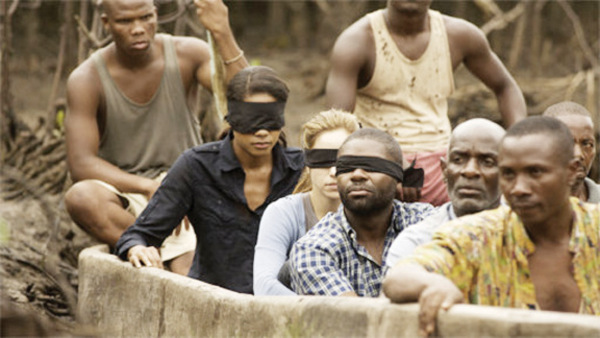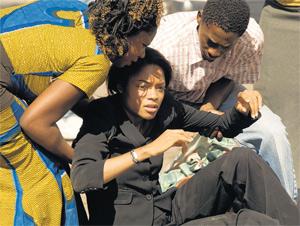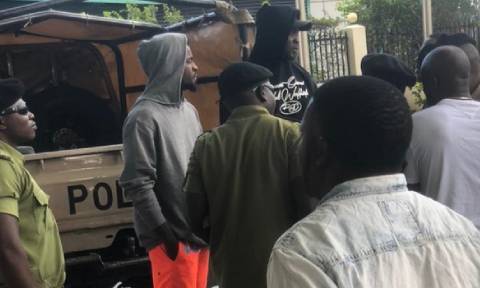
On March 15, 2010, MEND, the best known of the insurgent groups in the Niger Delta, detonated two car bombs at an Amnesty conference. There was a third bomb, which was not detonated because as MEND said in its press release, it “would have resulted in great loss of lives”. Their aim was not to kill people but to send a message about the Nigerian government’s unacceptable policy of too many conferences and too little action.
MEND have certainly killed innocent people – a few died in the most recent blasts – but for an armed group fighting its government, they have managed to cultivate a curious humaneness. They kidnap foreign oil workers, but treat them well and release them unharmed. They detonate bombs, but only away from crowds. Perhaps, this is why in ‘Blood and Oil,’ a film that pits the Nigerian government’s Joint Task Force against MEND, MEND emerges with a saintly halo, its leader a man camped out with his armed boys in the swamp, slightly crazed but only by his own idealism, and brimming with angry integrity. There is something naïve about this portrayal, because it makes MEND in particular and insurgent groups in general, seem incidental to the Niger Delta story.
‘Blood and Oil’ is a new thriller from the BBC that focuses on the kidnap of three white oil workers by MEND, the subsequent fall out, and the many layers of corruption it reveals. Of course, a single film cannot cover the entire complexity of that region, and the problem with making a film about the Niger Delta at all is that it will almost certainly be tainted by worthiness. It will be burdened by the need to Say Something. Issues will matter more than characters; indeed, characters will represent issues. All of these are true about ‘Blood and Oil.’ But it also has a certain admirable ambition, in its indictment of the Nigerian government and businessmen, and its central idea of multiple corruptions.
In Nigeria today, oil companies produce sleek annual reports that boast of their community initiatives but there isn’t a real interest in sustainability; they spend to keep their freedom to operate, rather than to invest in life-improving programmes. And, with the government’s continued unwillingness to deal properly with the insurgency, there is widespread expectation that oil companies will withdraw from on-shore operations and hand over to the Chinese. Oil bunkering is a major loss of revenue for them, but it isn’t really about villagerss bursting pipes to scoop oil with buckets. It is instead, well-organised large-scale heists that most people know about but very few acknowledge. Most of all, the Nigerian government can make real change if there is the political will. Surely, the Navy could seal off the major creeks where bunker ships go? Surely, the root causes of the insurgency – poverty and neglect of ordinary citizens in the Niger Delta – can be reversed? But there are too many people who benefit from the status quo and who have invested in keeping things unchanged.
‘Blood and Oil’ engages with all of these issues, but often in a heavy-handed manner, which does not only distrust its viewers’ intelligence but also results in nagging inaccuracies. Naomie Harris plays Alice, a Public Relations executive in a well-regarded firm and the British-born daughter of a wealthy Nigerian. When MEND kidnaps three white oil workers of an oil servicing company, Alice is sent off to Nigeria to take charge of the company’s public relations.
For a sophisticated woman with a Nigerian family, Alice seems strangely green about the country in particular and the ways of the world in general. She is bewildered, too gullible about what she is told, and it takes her too long to start to ask real questions. It is almost as if she is out of her depth, about to be blown away by the wind, figuratively as well as literally, being alarmingly thin. But she is the conscience of the film, the innocent whose eyes are opened and who happily goes native at the end. In the backdrop to Alice’s story, there are shadowy, frightening figures in dark glasses as well as quite a number of stony-faced Africans whose role is to add an air of general menace to everything.
Every background shot of the hotel manages to include Chinese businessmen, a crude and paranoid education for the viewer on the subject of ‘The Chinese Are Taking Over Africa’. And there is a silly scene in which all the couples in a reception area are white men with sexualised and slinky black women, another ham-fisted message for the viewer. Angel, the Nigerian girlfriend of the kidnapped Englishman, is the character who might have brought humanity to the ‘local’ womenfolk. When her lover’s wife, Claire, confronts her, Angel turns and runs, both apologetic and frightened. A bar girl in Port Harcourt runs because a white woman confronts her about sleeping with her husband? Seriously? It seemed as implausible as the Citroën used as a taxi at the airport. Citroens are terribly Francophone.
Now imagine a film set in contemporary England in which the British characters have quintessentially British names, have probably lived in Britain their entire lives, but all speak with American accents.
‘Blood and Oil’ is a film that names names – MEND, Joint Task Force – and a film that is clear about its contemporary Port Harcourt setting. There are scenes whose sole aim is to provide location authenticity, such as the Nigerian official slipping bribe money into his socks, the rowdy Nigerians in the economy cabin of an international flight, the excessive cell phone yakking, and these are all convincing. So, why are the accents so wrong? (“Where are these people from?” A Nigerian friend I watched the film with in Lagos asked). Sam Dede plays the Nigerian bad guy with dignified grace, and he is a relief to listen to because he alone sounds credibly Nigerian. It is lazy at best and patronising at worst to use characters who mostly speak a kind of generic Africanised-English; they become caricatures. Details matter because they lend authenticity and, for a knowledgeable viewer, can make the entire film believable or not.
Still, ‘Blood and Oil’ is worth watching for its ambition and for the unapologetic way in which it makes a case for the banality of greed. And then, there is David Oyelowo. He plays Kemi Tobodo, a young politician who works with grassroots local communities and is one of the negotiators trusted by MEND. Villagers gather to hear him speak. Children want to touch him. Oyelowo effortlessly inhabits his role and, apart from a few slips, the accent is right. He is straight-talking and resolute, full of charismatic sincerity, and wears his messiah image lightly in what is a phenomenal performance. He, quite simply, saves the film.
By Chimamanda Ngozi Adichie
Adichie is the Orange Prize winning author of ‘The Thing Around Your Neck’.




















